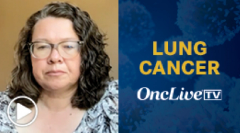
Dr. Florez (Duma) on Nihilism in SCLC
Narjust Florez (Duma), MD, discusses nihilism in small cell lung cancer.
Narjust Florez (Duma), MD, medical oncologist, associate director, the Cancer Equity Program, Dana-Farber Cancer Institute, discusses nihilism in small cell lung cancer (SCLC).
SCLC carries a stigma that can lead to nihilism surrounding the disease, and oncologists must work to address it, Florez says. Parts of that stigma stems from the fact that approximately 98% of SCLC cases can be attributed to smoking, Florez explains. Defeating that nihilism can help more patients get treatment for the difficult disease, Florez adds.
The development of more agents would also have a positive effect on the treatment landscape for SCLC, Florez continues. Lurbinectedin (Zepzelca) has emerged as a second-line treatment option for patients with SCLC, but there is still a need for agents in later settings, Florez says. After a patient progresses following second-line treatment, options are limited and typically involve the use of non–FDA approved drugs, Florez says. Even if some of these agents helps patients, the heterogeneous approach makes it impossible to determine which regimens are truly the most effective, Florez concludes.










































